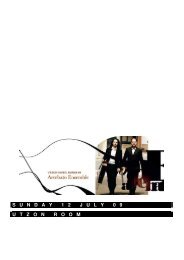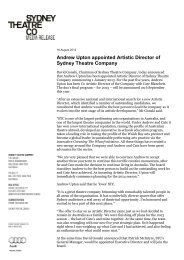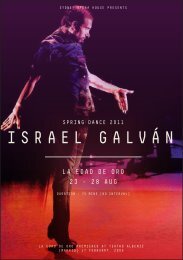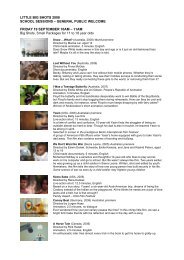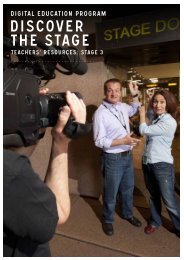July 2 â 3 - Sydney Opera House
July 2 â 3 - Sydney Opera House
July 2 â 3 - Sydney Opera House
You also want an ePaper? Increase the reach of your titles
YUMPU automatically turns print PDFs into web optimized ePapers that Google loves.
PART 8: THINKING ABOUT FILMS, A RESOURCE FOR PARENTS AND TEACHERS<br />
Screen literacy: thinking beyond the screen<br />
Going to the movies can be great fun! It can also be an enjoyable way to learn about our world and the people<br />
who live in it. Whether you are viewing a film for entertainment or as a learning experience, thinking and<br />
talking about it with others can help everyone to understand more about the story and its messages and find<br />
out more about how films are made. Focused discussions can help us to become more aware of thinking<br />
behind the choices and decisions made by filmmakers. In turn this can help us to express our own ideas,<br />
thoughts and feelings more clearly and effectively.<br />
Pre-screening questions<br />
• What do you like about going to the cinema? How is it different from viewing television?<br />
• What do you already know about the film or films you are about to view?<br />
• How did you find out the film or films?<br />
• Why do you think this film, or these films, may have been made?<br />
• What can you find out about a film and about filmmaking by reading film credits?<br />
• Questions to think about while viewing films<br />
• What did the film make you think about?<br />
• How did the film make you feel?<br />
• How did the filmmaker make you feel this way? You might think about how the filmmaker used the<br />
camera, lighting, types of actors used (live or animated), costumes, props, sound or other interesting<br />
aspects of creating a story for you to view on screen.<br />
Post-screening questions<br />
• Did you enjoy the film? Why or why not?<br />
• Did the film remind you of any other films? In what ways?<br />
• What types of characters were in the film?<br />
• Did you like the characters? Why or why not?<br />
• Did you care what happened to the characters? Why or why not?<br />
• Why do you think some films include characters that many people will not like?<br />
• Did the film remind you of anything from your own life?<br />
• How do the Indigenous people or characters in the film solve their problems?<br />
• What can Indigenous people or adults do in real life if they have problems that are difficult to solve?<br />
• Are there things about some of the film characters and their lives that surprised you?<br />
• Did the film end in the way your expected? Were you satisfied with the ending? In what other ways<br />
could it have concluded?<br />
• Was this film, or these films, like shows or films you usually watch on TV or at the cinema? What are<br />
some similarities and differences?<br />
Thinking more about the film<br />
Do you think the filmmakers selected appropriate setting/s for the film/s? Why do you think these choices<br />
were made?<br />
Were particular colours featured in set design, costuming or props? How can this help to create mood or<br />
atmosphere? How does the ‘look’ of the film contribute to the story or to the message of the film?<br />
Message Sticks Teacher Kit 2008 ©ACMI 35








